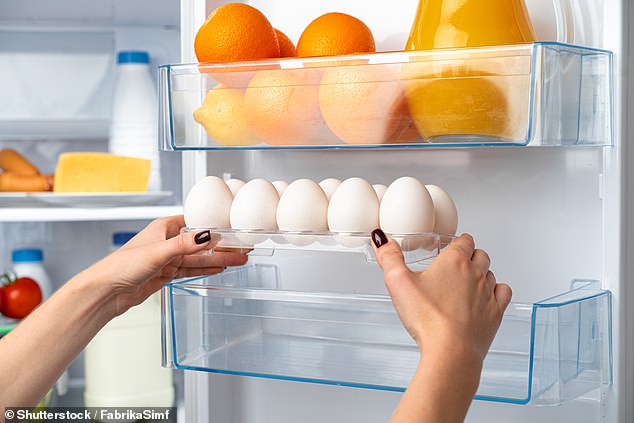You’ve been storing your eggs wrong! Experts reveal the correct place to keep them – and it’s NOT in the fridge door
They’re a staple item in kitchens across the UK.
But it turns out you’ve probably been storing your eggs wrong.
That’s according to Adam Oakley, a storage expert from Door to Store, who has revealed the correct place to keep them.
Most fridges are fitted with designated egg compartments in the door.
However, Mr Oakley says that this position is far from ideal – and could actually increase the risk of contamination, as well as breakage.
‘The fridge door experiences constant temperature fluctuations due to regular opening and closing,’ he explained.
‘This unstable environment creates conditions where bacteria can thrive and can weaken the egg’s natural protective barrier, speeding up spoilage.’
Instead of the door, the expert claims that eggs should be placed in the deeper, middle section of your fridge.

Most fridges are fitted with designated egg compartments in the door. However, Mr Oakley says that this position is far from ideal – and could actually increase the risk of contamination, as well as breakage
The middle of your fridge maintains a consistent temperature, typically below 2°C.
This is crucial for preserving your eggs’ freshness, according to Mr Oakley.
You might worry that keeping your eggs in the middle of the fridge will leave them at risk of unwanted smells or flavours from other foods.
However, Mr Oakely says that a dedicated tray or container with a lid should do the trick.
‘This extra step not only helps maintain quality but also keeps your fridge more organised,’ he added.
Meanwhile, for those tempted to skip the fridge altogether, Mr Oakley strongly advises against this.
‘Eggs stored at room temperature start losing quality within a few days, especially in warmer climates,’ he noted.
‘While eggs kept outside the fridge should ideally be used within 1–3 weeks, refrigerated eggs can last up to 3–5 weeks with their freshness intact.’

The middle of your fridge maintains a consistent temperature, typically below 2°C. This is crucial for preserving your eggs’ freshness, according to Mr Oakley
However, even refrigerated eggs have a best-before date.
‘While refrigeration significantly extends shelf life, it’s always best to consume eggs within a few weeks to ensure optimal taste and quality,’ Mr Oakley added.
Beyond the fridge placement, the expert also has several tips to keep your eggs fresher for longer.
Firstly, he advises storing them in their original carton, which will provide a protective barrier.
Next, avoid washing your eggs before storing them, as this removes their natural coating and makes them more susceptible to bacteria.
You should also place the eggs with the pointed end down, to help maintain the yolk’s central position.
Finally, Mr Oakley says that you should keep eggs away from strong-smelling foods to stop them from picking up any unwanted odours.

